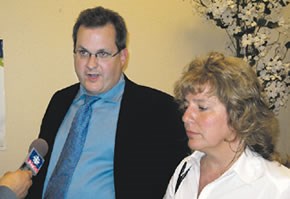BY JANET GIBSON AND LAUREL MYERS
A family that lost a husband, father and son almost two years ago looked to the future on Friday after five jurors delivered 16 recommendations at the coroner’s inquest into the death of Sudbury miner Ray Campeau.
Coroner Dr. Raymond Sawkiw lauded the two women and three men for their grace and tolerance. They heard from 13 witnesses over five days and deliberated for seven hours Friday afternoon.
“It was first class all the way,” said the family’s lawyer Russell Howe.
Campeau’s wife Faye said she felt “a little bit of anxiety”on Friday as she sat at a table in the courthouse. Her children, Jamie and Kevin, mother Donna and brother Jason had sat by her side throughout the week.
“The way I handled my grief was to go on a fact-finding mission to find out what happened to my husband,” she said.
After hearing the recommendations, she said, “I’m absolutely pleased with them.”
Mr. Campeau worked as a maintenance mechanic at the Podolsky Mine, north of Capreol, for Dynatec Corp. On May 25, 2006, while changing a motor in a winch system holding up a jumbo drill in the shaft, the brakes on the system let loose, causing the drill to drop, which in turn caused the motor’s exposed gears to start spinning.
A socket extension used to loosen the motor somehow entered into the motor, causing the gears to jam and one to shoot out, Tim Merla, regional engineer with the Ministry of Labour, explained in his testimony.
Seven of the jury's recommendations were directed specifically at the Ministry of Labour, suggesting reviews of existing mining regulations, and practises involving inspection and investigative roles.
The remainder of the recommendations were more industry specific.
The possibility of water contamination being the cause of the brake failure was questioned numerous times throughout the inquest. One recommendation was for the installation of a protective covering over all lifting devices and braking components. As well, a recommendation asked for operating manuals, guidelines and drawings for each piece of equipment to be readily accessible to the workers.
Dr. Chris Bourdon, trauma team leader at the Sudbury Regional Hospital, and Michael Parent, the health and safety co-ordinator at the mine until April 2006, testified that little could have been done below ground to help Mr. Campeau following the accident, and that First Aid equipment would have had little, if any, impact on the outcome.
However, the jury recommended First Aid equipment be available and maintained on each working level of the galloway, a movable platform used in the shaft. Also, the jury recommended all underground employees should have a minimum of CPR and basic First Aid training and maintain their certification.
The final recommendation – that properly engineered tie-offs for the jumbo drill must be installed, identified and utilized by employees to ensure safety – was particularly important to Faye, she told Northern Life.
“Properly engineered tie-offs are necessary,” Howe said. “It was a callous attitude on the part of the company to think jury-rigged tie-offs would work.”
With the inquest behind her, Faye said she looked forward to leading a normal life.
“This is the first time I’ve had some relief.”
Join Sudbury.com+
- Messages
- Post a Listing
- Your Listings
- Your Profile
- Your Subscriptions
- Your Likes
- Your Business
- Support Local News
- Payment History
Sudbury.com+ members
Already a +member?
Not a +member?
Sign up for a Sudbury.com+ account for instant access to upcoming contests, local offers, auctions and so much more.
